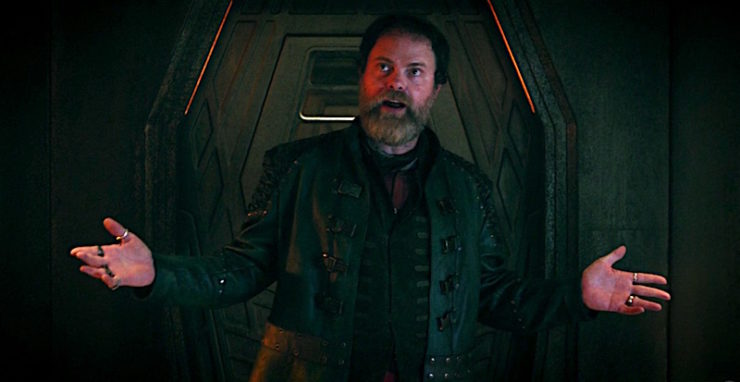Harry Mudd is one of Trek’s most infamous villains. And I say villain because, while he may be amusing in the extreme, he is a truly odious person. His two appearances appearances on Star Trek: The Original Series (and a third on the animated series) prove him to be a narcissist of the highest order, who cares only for his personal survival and comfort. He is liar, a coward, and a rampant misogynist. And in his premiere appearance on Star Trek: Discovery, he does nothing to dispel any reservations one might have about his character—but he does tell a very interesting story to Captain Lorca….
What viewers knew of Mudd for the last fifty years is largely due to two guest appearances on TOS. After introducing himself to the Enterprise crew by getting caught trafficking women (while supplying them with drugs intended to make them more appealing to the husbands he was planning to sell them to), he was incarcerated for illegal activities. After leaving prison—via escape or serving out his sentence, it is never made clear—he ended up in even more trouble, attempting to sell patents he didn’t hold the rights to on a planet where the penalty for fraud was death. He managed to avoid punishment for that particular crime, leading to Captain Kirk and crew running into Harry again, this time on a planet full of controlling androids.
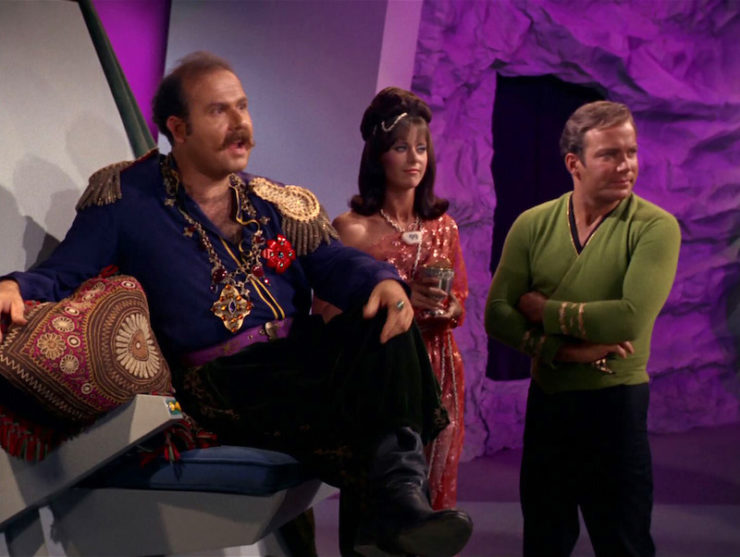
One of the most important aspects to Mudd’s character is how he frames stories about himself. Kirk learns this quickly, and understands that all of Harry’s tales require some manner of “interpretation.” This is how he reacts to the man’s explanation for how he ended up on the android planet, following the patent fraud fiasco:
MUDD: Well, of course, I left.
KIRK: He broke jail.
MUDD: I borrowed transportation.
KIRK: He stole a spaceship.
MUDD: The patrol reacted in a hostile manner.
KIRK: They fired at him!
MUDD: They’ve no respect for private property. They damaged the bloody spaceship!
Kirk knows that he can’t trust a thing that Harry says—and it’s not just because he’s a liar. Harry Mudd likes to rewrite stories about himself to cast his journey in a more heroic light. His moral bankruptcies are moral disagreements, his criminal actions the result of a difference in opinion about what constitutes criminality. Harcourt Fenton Mudd is a fascinating study in the psychological effects of personal narrative. We know that how we tell stories about our own lives is a part of what makes us human, and indeed makes us who we are on an individual basis. And Harry Mudd is spectacular at this particular skill.
One of the interesting (and infuriating) sidenotes to Harry’s time on the android planet is that he asks the androids create a replica of his dear wife, Stella. According to Harry, Stella is one of the reasons for his life of crime out among the stars—because she urged him out there due to her “continual, eternal, confounded nagging.” As Harry tells Kirk and company: “I think of her constantly, and every time I do, I go further out into space.” The android version of Stella does nothing but nag and insult Mudd in a continuous stream of verbal abuse that Harry can silence merely by barking “shut up!” Getting the last word with her is a true pleasure for him… one that Kirk ruins when they abandon Mudd on the planet after apparently populating it with 500 new android versions of Stella that do not power down the instant Harry tell them to. He tells Kirk that this punishment is inhuman to no avail.
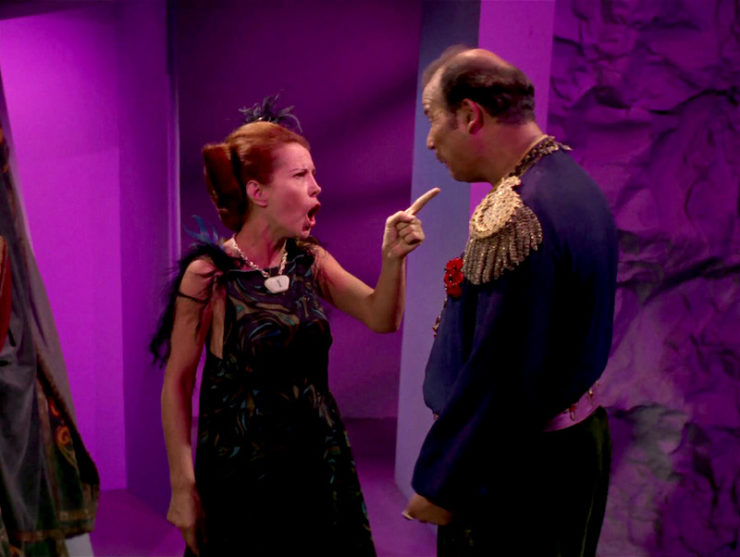
These jokes are a product of their time, to be certain. The nagging wife, the cad who can’t seem to pass a day without doing something illegal, the eternity lambasted by the specter of a woman left behind. But the question that no one seemed to ask was simple enough—was Harry telling the truth about Stella at all?
Mudd’s appearance on Star Trek: Discovery chips away at this narrative, or at least offers viewers a different version of his story. When Captain Lorca is imprisoned on a Klingon ship, he is thrown in prison with Mudd and asks the man how he ended up in such dire straits. Harry tells him that he fell in love with a woman beyond his means:
“Sweet Stella. Her family didn’t approve of me, so I had no choice except to try and buy her father’s respect. Scary, scary man. So I borrowed a large sum from some non-traditional lenders, and gifted her with a moon. It worked like a charm… until I fell behind on my payments. The creditors came after me, chased me into enemy territory, right into the Klingon’s arms, who deposited me here where I await my fate.”
There are many possibilities from what we learn here. Perhaps Harry Mudd simply wanted to marry a rich woman, and in doing so, wound up way over his head. His insistence on love could be a ploy to gain sympathy from a friendly ear, to add a layer of tragedy to his ridiculous story. Then again… perhaps Harry did love Stella. Perhaps the beginning of this relationship was indeed a tender one. In which case, what happened for us to arrive at the shrieking android incarnation that we see a decade later? Did it take Harry too long to return to his beloved wife? When he made it back to her, was she (understandably) furious due to his lies and his absence, and took it out on him with insults and jibes? There are countless iterations of this tale that could result in a falling out and subsequent miserable union.
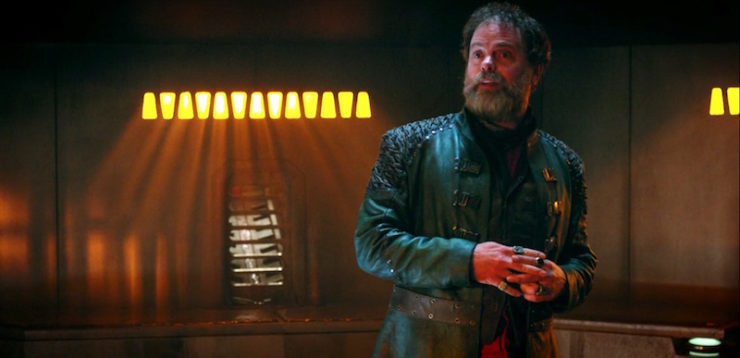
And then there’s another possibility. That Harcourt Fenton Mudd never made it back to Stella after running from those moon creditors. That his travels and his confidence games and the mess of his life dragged him further and further away from someone he genuinely cared about, and that he knows the fault lies with him. What if that android version of Stella is complete lie? What if Harry Mudd has imagined this version of Stella into being so he can avoid his own guilty conscience? It is a lot easier to think yourself the injured party if you’re trying to avoid responsibility for your actions. Which is pretty much Mudd’s M.O. dialed to nine-thousand percent.
This contradiction in Harry’s biography comes in an episode that is all about personal narrative and how we frame our own actions. “Choose Your Pain” sees several characters give accounts that are questionable, or engage in arguments that come down to point of view. When Michael Burnham confronts Lieutenant Stamets about her fears that the spore drive is harming their tardigrade pilot, Stamets points out that it was Burnham who discovered how the tardigrade could be implemented in the drive’s use—it’s her fault that the situation existed in the first place. When Burnham says she’s fighting the impulse to “set the record straight” on that account, Stamets has little time for the argument: “That won’t get us anywhere. Do you want to be right, or do you want to fix this?” He rejects the importance of personal narrative in this case, as it delays actions being taken toward solving the problem.
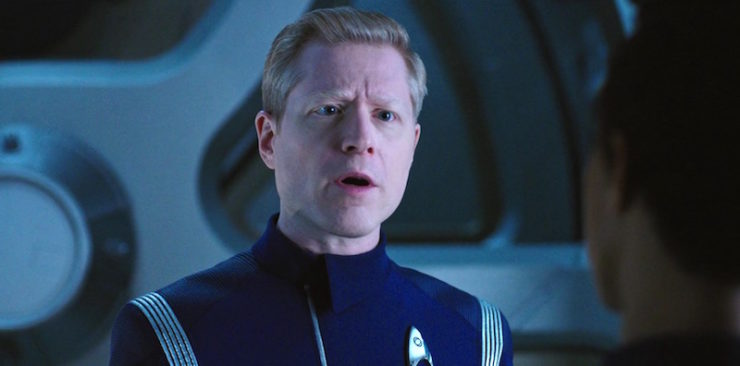
First Officer Saru spends the episode concerned over how his personal narrative entwines with others; worried that he does not have the making of a commanding officer, Saru asks the ship’s computer to compare his actions to those of Starfleet’s most revered captains. He believes that his validity as an asset to the Federation must be checked by an outside source, but eventually learns to trust his own instincts. He later deletes the protocol designed to compare his performance and chooses to accept his responses on their own merit.
Personal narrative is also at the center of Captain Lorca’s time in the Klingon ship’s prison cell. He learns not to trust Harry Mudd (as everyone eventually does), but he comes to trust an imprisoned Starfleet Lieutenant named Ash Tyler, eventually bringing him aboard his ship and instating him as a crew member. Lorca also has some painful details about his previous command revealed by Harry, and feels the need to set the record straight—he tells them that with his ship, the USS Buran, boarded by the Klingons, he made the decision to self-destruct the ship with his crew on board. He tells Mudd and Tyler that he did it to spare his people the long, torturous deaths that he knew were awaiting him on the Klingon homeworld. That Tyler stands by Lorca despite this tale is a testament to the swift bond they forge by the end of their time in that prison cell.
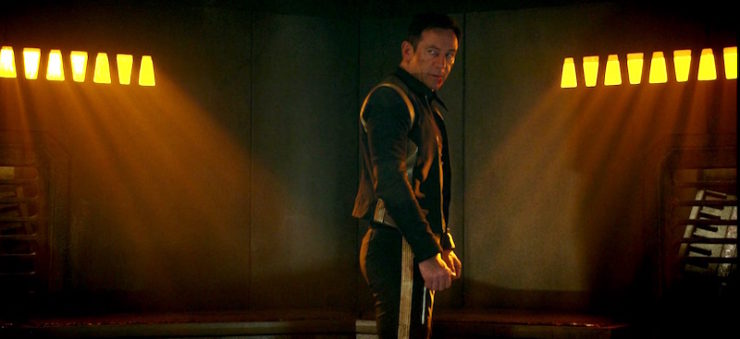
But, as with Harry Mudd, you have to ask the question—is that the true story? Or all of the story? It seems unlikely that Starfleet would award a captain who had done something so horrific with one of the most important assignments in their war against the Klingons. What else could Lorca be hiding? And what might those secrets mean for everyone aboard the Discovery? In this sense, every element of “Choose Your Pain” has been honed by the concept of personal narrative. Its power as a psychological factor in all people is driving the story forward.
It is hardly surprising that an episode featuring Harry Mudd would incite such a careful look into these particular concepts and questions. As for what that means for the future of Discovery, or Harry Mudd himself? We will surely have to wait and find out….
Emmet Asher-Perrin will always welcome the intrigue that Harcourt Fenton Mudd adds to any story. You can bug her on Twitter and Tumblr, and read more of her work here and elsewhere.










